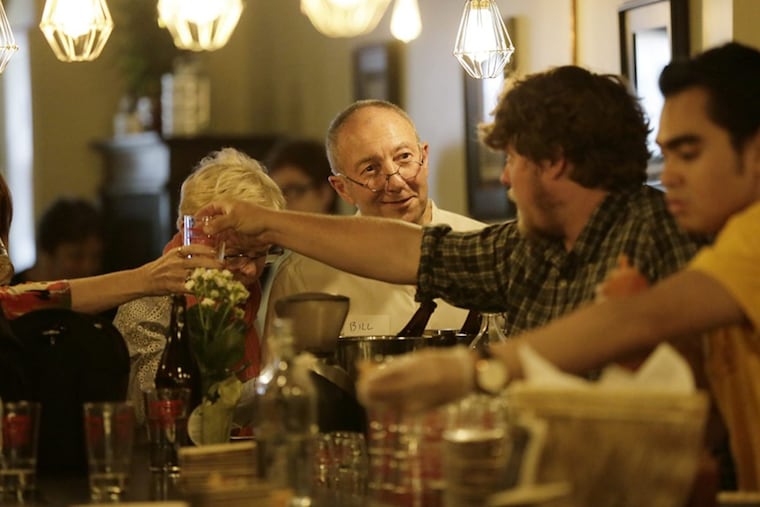South Philly's 'muhibbah' dinners celebrate diversity, immigration, and real-life melting pots
"Immigrants and refugees are the people that keep things running in this country," said Angelina Branca, of Sate Kampar. "They're in every kitchen, on every farm. But most of us only see what they produce, not the people behind it."

Tova Du Plessis, the South African immigrant behind Essen bakery, cooked up a big batch of bobotie, a curried minced meat stew with a custard topping that is her homeland's national dish.
Saw Maran Tan, a Burmese refugee, brought Devil's Chicken Curry, a Malaysian dish he perfected while working in that country as a chef before he settled here. And Pat O'Malley, pastry chef and co-owner of Hungry Pigeon and a native of Iowa, prepared an American gas-station classic: deep-fried cherry hand pies.
The occasion was the first in a series of dinners dreamed up by Angelina Branca, owner of Sate Kampar, to bring together Philadelphia chefs to celebrate the restaurant industry's rich diversity, while raising money to help the local immigrant population.
Last week, Branca and six other local chefs and one cidermaker realized the first of what Branca is calling the "Muhibbah dinners." Muhibbah is a Malay word meaning "people of multiple cultures and diverse backgrounds coming together in peace and tolerance." According to Branca, Muhibbah was an essential part of her daily life when she was growing up in Kuala Lumpur, such as the occasional times she remembered when Ramadan and Chinese New Year overlapped for a night and when cities merged their celebrations for a festival, converging their different ethnic traditions.
Branca wanted to bring that same spirit of cultural cohesion to Philadelphia, because of its large immigrant and refugee populations and because those same groups, Branca said, often go unappreciated.
"Immigrants and refugees are the people that keep things running in this country," Branca said. "They're in every kitchen, on every farm. But most of us only see what they produce, not the people behind it."
Branca conceded that even she had not fully grasped the contributions of America's immigrant population when she moved here 17 years ago as a corporate intercompany transfer. She had worked in strategic planning at IBM and as a senior director at Deloitte and Fujitsu. Ultimately, she decided to leave when her work became more about politics than the things she enjoyed.
It was only after she opened her restaurant that she was exposed to the undocumented community –– "people who came here trying to survive."
Especially at this time when anti-immigrant sentiment is being expressed, Branca wanted to do more for the immigrant communities that she encountered in the restaurant industry. That's why, for the Muhibbah dinners, Branca partnered with (and will donate all of the event's profit to) the Hebrew Immigrant Aid Society (HIAS), one of only three organizations in Philadelphia helping to resettle refugees and immigrants seeking asylum.
The final menu included representatives and their recipes from four different continents, many of whom had picked up other cultural influences on their way to the United States.
Tan, for example, comes from Burma, but fled to Malaysia in the late 1990s. His Devil's Chicken Curry dish is actually a blend of Portuguese and Malaysian cuisines, as Tan cut his culinary teeth in the multicultural kitchens of Kuala Lumpur, before finally receiving refugee status and emigrating to the United States in 2014.
Sam Jacobson, a British immigrant and owner of pie shop Stargazy, brought spherical blood sausages on skewers. One undocumented chef from Indonesia, who asked not to be named, prepared a crunchy fried tempeh. Top Chef-winning Nick Elmi — who grew up in western Massachusetts to Sicilian and Irish parents and now serves French cuisine at his restaurant, Laurel — cooked a cured swordfish in an homage to his Italian roots.
The meal was framed by two pours of a cider prepared by Ben Wenk, seventh-generation local farmer and founder of Ploughman Farm Cider. The "collaboration" cider, which Wenk is calling Muhibbah, uses three kinds of Pennsylvania apples and an array of Malaysian spices. A portion of the cider's profit will go to HIAS.
Branca prepared a rice salad called Nasi Ulam Raja, which used to be very popular in Southeast Asia, but has been dying out. The salad's titular herb, ulam raja, which Branca described as having "at once the flavor of parsley and mango," is so rare that Branca had to grow the plant herself just for this meal.
The dinner's finale, prepared by Hungry Pigeon's O'Malley (who previously ran the bakery operations at Balthazar in New York City), contributed a uniquely American cuisine –– gas-station junk food. O'Malley served his perfected version of a fried cherry pie, served in folded wax paper so guests could take them "to-go."
Among the dinner's attendees was Philadelphia Mayor Kenney, who has been vocal during his term about his support for Philadelphia's immigrant and undocumented populations. On his first day in office, Kenney reinstated Philadelphia's sanctuary-city status, which had been rescinded by former Mayor Michael Nutter.
"I come from a family of Irish refugees myself," Kenney said. "I see today's immigrants as people just like my family, people who want to feel safe in their houses, in their streets –– people who want to taste democracy and revel in it."